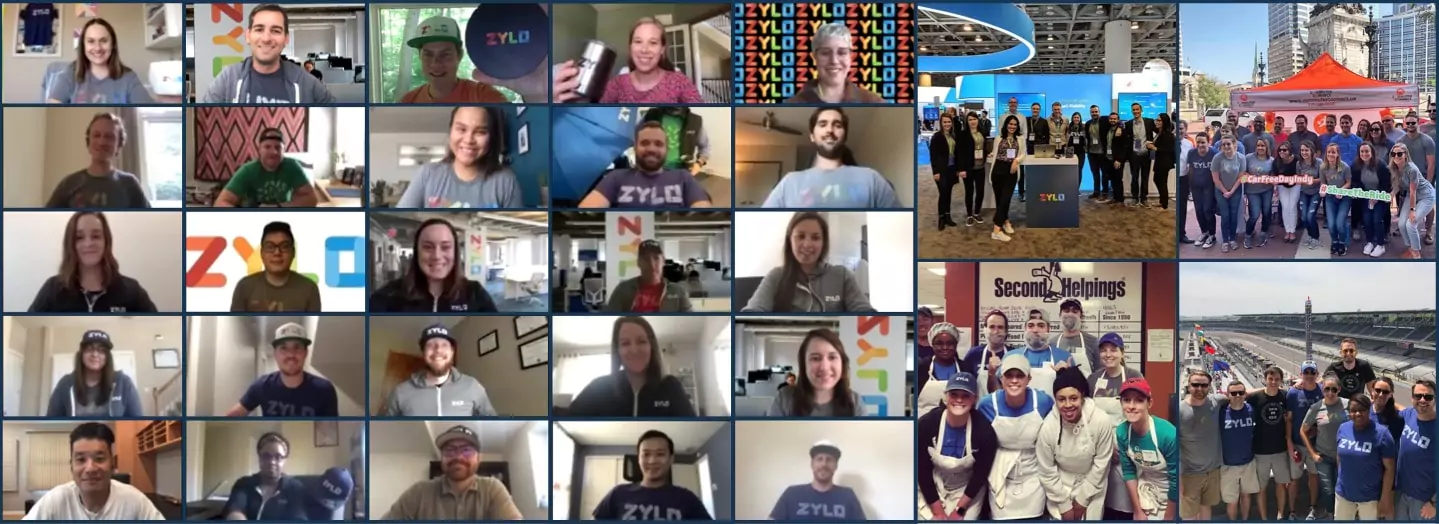
An Inside Look at Zylo’s Engineering Team
There’s never been a more exciting time to be an engineer...
Back
Back
Search for Keywords...
Zylife Blog

11/15/2018
Just over 2 years ago I decided to leave my job at a large tech company to join Zylo. At the time Zylo was a new company mere months post-launch. A worthwhile risk for the opportunity to experiment, develop a category, and iterate quickly with a team I knew could build an industry-leading product.
Just as I caught my stride with our early customers, business was booming; it became clear I needed a team – stat. Thus bringing up the next round of learning. How do we keep that spirit of Zylo as a 10 person company thriving at 25 or 50+ while developing the leadership skills we need through that growth?
Being a startup meant we didn’t have the formal leadership programming some larger companies have at their disposal, but I quickly learned that doesn’t mean you are on your own. High Alpha, a Zylo Investor, has hosted functional programming for CS, Product, Sales, and Marketing leaders for quite some time.
This year, High Alpha launched their Leadership Flight School that provided some amazing learnings and helped strengthen the network of leaders across the portfolio. Leveraging resources like High Alpha’s Leadership Flight school shines a light on the resources that are out there; you just have to find them.
I’ve captured a few key takeaways from a High Alpha Leadership Flight School session.
Growing from a 1-person show handling all of our customers to a team with divided responsibility brings all kinds of challenges. Your earliest hires not only build lasting processes and value in your business; they will also be the future leaders as you continue to grow – a lot of pressure to get it right. Here are a few ways you can be successful in managing growth.
This common mantra, published in Jim Collins’ Good to Great (a highly recommended book brought up multiple times in the sessions), is critical to building a great team. Finding individuals who will strive and grow in a fast-paced environment while bringing unique skills to the team cannot be understated.
I was fortunate to be able to hire opportunistically and bring on not one, but two rock-star CSMs out the gate who each bring unique skills and a strong collaborative attitude. In the last two months, our CEO and I have had over 6 exec sponsors at our customer’s companies reach out to complement their work. This is 100% attributable to their individual work, skills, and collaboration.
It is so easy to focus on the next challenge, the next opportunity, the next fire-drill without pause. However, time is critical to creating inflection points to discuss development opportunities. This is particularly true with a team of high-achievers where a velocity of productivity is just their normal stride. There are a few key areas to check-in and align:
Lessonly CEO, Max Yoder, shared his first-hand experience with the group, showing his commitment to the leaders from Lessonly in attendance as well as the greater Indy-tech community. Many of the insights he shared are from his upcoming book (that will certainly hit my reading list). He encouraged these key focus areas:
Share Before You’re Ready: In a fast-paced environment, it’s very easy to go heads-down and work in a vacuum. Max shared a story of spending 9 months building some innovative feature sets everyone was excited to push live. Within three minutes of the day it was shared, he received an email asking, “This is FANTASTIC, but what about X?”
That “X” is something that may or may not have come up in that planning and building phase, but it’s existence and importance could have been known far earlier had it been shared along the way. We all have an “X” that if we don’t share early we may miss. Getting feedback on a product feature, the internal process from the stakeholders, or really anything you’re building is critical.
Be what you want to see happen and celebrate when it happens: This is easy to think of for quotas, renewals, and releases, but to limit the phrase to that is a disservice. Celebrate collaboration or team members stepping up to help another or representing the company’s culture. While being that example for your team, you also must be willing to be vulnerable.
Tying back to “share before you’re ready,” be willing to share out ideas or plans that aren’t completely baked and take that feedback genuinely. Setting this example helps build a culture of constant improvement and openness.
After reflecting on learnings from High Alpha’s Leadership Flight School session, I want to reiterate that even in a new company, you aren’t alone on an island. You have your network, your mentors, your peers, and your HR colleagues. You aren’t the only one thinking of these questions: always reach out to your resources.
The most important thing you can do as a leader of a team or even just the leader of your own career is to be thoughtful, inquisitive, and reflective. By doing that you will inherently uncover opportunities you otherwise wouldn’t have – much like finding a three-month-old start-up you’re willing to leave a comfortable job to join.

There’s never been a more exciting time to be an engineer...

As we enter 2021 with a greater awareness of the daunting...


Ryan Carman studied mechanical engineering before taking on business and data...
| Cookie | Duration | Description |
|---|---|---|
| cookielawinfo-checkbox-analytics | 11 months | This cookie is set by GDPR Cookie Consent plugin. The cookie is used to store the user consent for the cookies in the category "Analytics". |
| cookielawinfo-checkbox-functional | 11 months | The cookie is set by GDPR cookie consent to record the user consent for the cookies in the category "Functional". |
| cookielawinfo-checkbox-necessary | 11 months | This cookie is set by GDPR Cookie Consent plugin. The cookies is used to store the user consent for the cookies in the category "Necessary". |
| cookielawinfo-checkbox-others | 11 months | This cookie is set by GDPR Cookie Consent plugin. The cookie is used to store the user consent for the cookies in the category "Other. |
| cookielawinfo-checkbox-performance | 11 months | This cookie is set by GDPR Cookie Consent plugin. The cookie is used to store the user consent for the cookies in the category "Performance". |
| viewed_cookie_policy | 11 months | The cookie is set by the GDPR Cookie Consent plugin and is used to store whether or not user has consented to the use of cookies. It does not store any personal data. |